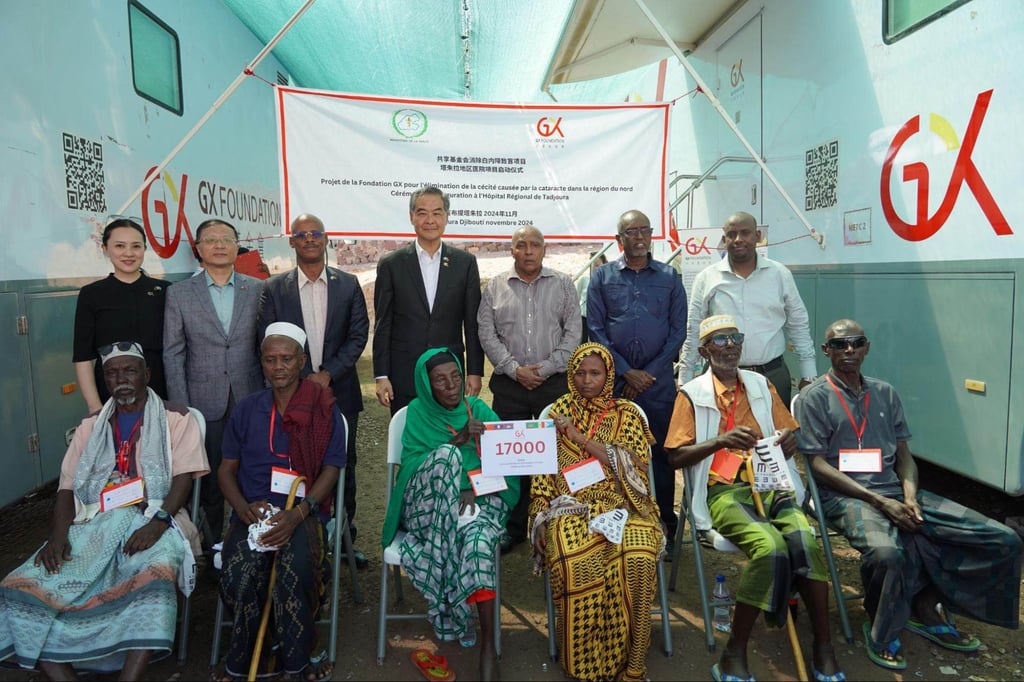
 i_need_contribute
i_need_contribute
Beijing has stepped up public health assistance to its strategic African partner Djibouti – home to China’s only overseas military base – with a new focus on dengue fever and plans for the country’s first traditional Chinese medicine (TCM) centre.
Djiboutian Health Minister Ahmed Robleh Abdilleh, a medical doctor and also a TCM advocate, has pledged to “serve as an ambassador for promoting the culture of Chinese traditional medicine”.
Abdilleh made the pledge during a meeting with the director of China’s National Health Commission in Beijing in early December, on the sidelines of an international conference on TCM sponsored by the World Health Organization.
China aims to train 1,300 overseas health workers in TCM over the next three years and has been encouraging more use of its therapies, which include acupuncture, massage and cupping, especially among its Belt and Road Initiative partners.
Mainland Chinese medical teams stationed in Djibouti have been helping the country with health issues for a number of years, in partnership with GX Foundation, a Hong Kong-based NGO.
The NGO’s founder, Leung Chun-ying – a former chief executive of Hong Kong – and members of the mainland Chinese medical teams discussed the benefits of TCM at a reception last month with Abdilleh in Djibouti.
They noted that TCM methods could provide suitable care for the many Djiboutians with nerve paralysis from extreme UV exposure, as well as people recovering from car accident injuries.
“In such cases, traditional medicine often provides effective alternatives to expensive surgery and Western medicine,” said Leung, who is also a vice-chairman of Beijing’s top political advisory body, the Chinese People’s Political Consultative Conference.
“TCM is natural, non-invasive, and offers more treatment options, reduces reliance on Western medicine, especially in developing or underdeveloped regions, where Chinese medicine is often more cost-effective and can be locally produced,” he said.
Leung’s visit aimed to promote further health cooperation with Djibouti – GX Foundation’s first African partner – where it carried out its 17,000th free cataract operation globally as part of a five-year mission to eliminate blindness in least developed countries.
According to GX, it has so far carried out more than 3,300 free cataract surgeries across Djibouti.

Leung Chun-ying (standing, centre), with (from left) GX CEO Emily Chan, Chinese envoy Hu Bin and Djibouti’s Health Minister Robleh Abdilleh, at an event in Djibouti to mark the work of GX Foundation. Photo: Handout
Pan Xiaoxia, leader of the Djibouti-based medical team and an eye specialist of 30 years, said most cataract cases in the country required level 4-5 surgeries – significantly more severe than in mainland China, where even level 3 cases were rare.
“Cataracts are particularly severe in countries like Djibouti due to extreme UV levels, posing super high risk from unprotected sun exposure,” he said. This severity, combined with language barriers, adds to the complexity of the operations.
A senior adviser with the NGO who has travelled to Djibouti many times to coordinate operations, said the country had, at most, two to three eye doctors available at any given time. The need for skilled medical intervention was “dire”, he said.
“Most poor and underdeveloped countries would prefer cash donation, for obvious reasons, which is what most international NGOs do,” said the adviser, who asked not to be identified. He added that the Chinese approach prioritised fixing systemic problems, ensuring lasting impact.
Last month, the foundation signed a new agreement with Djibouti that will address some of the mosquito-borne diseases that lack effective vaccines, such as dengue fever.
GX Foundation has also signed an MOU with the contractor of an intercity highway in Djibouti that also built a China-aided hospital unveiled last week – to provide preventive anti-mosquito and anti-fly equipment for its workers.
Speaking to the South China Morning Post after the MOU signing, Emily Chan Ying-yang, the foundation’s CEO and director of the Chinese University of Hong Kong’s Centre for Global Health, explained the need to address these lesser-known diseases.
The NGO decided to focus on dengue fever instead of more widely recognised diseases like malaria because “this lesser-known disease often goes unnoticed, but its impact can be devastating”, she said.
Abdilleh told the Post that the medical and health cooperation agreements with Beijing marked a milestone in his ministerial career and reaffirmed Djibouti’s universal healthcare commitments.
About 30 per cent of local patients and commuters were not Djiboutian citizens, he said. “Viral diseases know no borders or nationality so there is no choice but to address these threats as critical health issues.”
Meanwhile, China’s naval hospital ship Peace Ark left Djibouti in early December after providing free treatment to 5,800 patients, conducting 2,377 medical examinations, and performing 48 free surgeries.